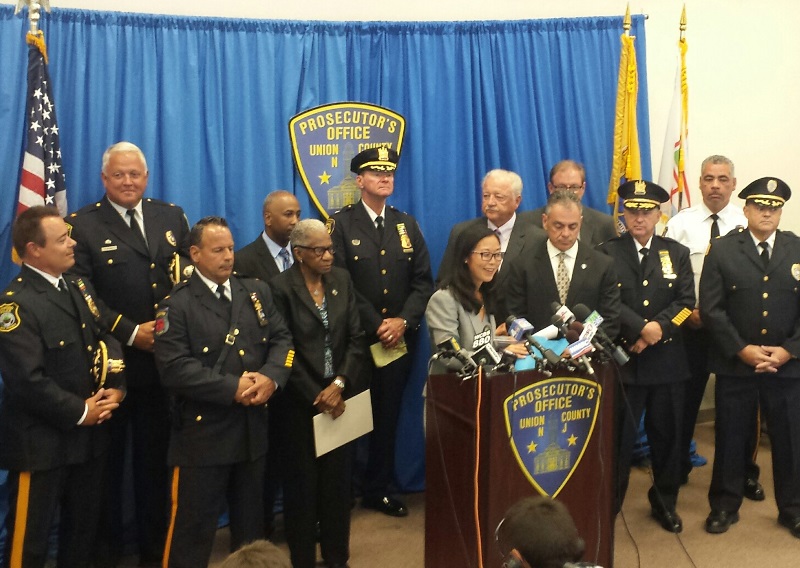 Patrol officers in eight of Union County’s 21 municipalities will be wearing body-worn video cameras by the end of next month as part of New Jersey’s largest county-funded, multi-municipality pilot program of its kind unveiled to date, Union County Prosecutor Grace H. Park said Tuesday in a joint announcement made with the leaders of each of the participating police departments: Elizabeth Police Chief Patrick Shannon and Director James Cosgrove, Plainfield Police Director Carl Riley, Linden Police Chief James Schulhafer, Scotch Plains Police Chief Brian Mahoney, Roselle Park Police Chief Paul Morrison, Mountainside Police Chief Alan Attanasio, Fanwood Police Chief Richard Trigo, and Garwood Police Chief Bruce Underhill.
Patrol officers in eight of Union County’s 21 municipalities will be wearing body-worn video cameras by the end of next month as part of New Jersey’s largest county-funded, multi-municipality pilot program of its kind unveiled to date, Union County Prosecutor Grace H. Park said Tuesday in a joint announcement made with the leaders of each of the participating police departments: Elizabeth Police Chief Patrick Shannon and Director James Cosgrove, Plainfield Police Director Carl Riley, Linden Police Chief James Schulhafer, Scotch Plains Police Chief Brian Mahoney, Roselle Park Police Chief Paul Morrison, Mountainside Police Chief Alan Attanasio, Fanwood Police Chief Richard Trigo, and Garwood Police Chief Bruce Underhill.
Taser International will be supplying equipment, installation, and training for each of the participating departments during the coming weeks, including the provision of a collective total of 550 body-worn cameras weighing 3.5 ounces apiece.
All of Union County’s municipal police departments were contacted earlier this summer to gauge their interest in participating in the program, and while the initial goal was to involve a small handful of departments, all of those that expressed interest ultimately were included. The program is being funded by a unique cost-sharing framework – for each participating department, the first-year average cost of approximately $1,350 per officer (approximately $750,000 total) is being covered by Prosecutor’s Office forfeiture funds, supplemented by $125,000 in forfeiture funds from the New Jersey Office of the Attorney General, while the departments’ municipalities then are agreeing to multi-year contracts costing an average of $670 per officer, per year thereafter.
The body cameras record at all times, but they only save footage 30 seconds retroactively from the moment of activation. Officers wearing the cameras will be required to activate them – a process that involves simply pressing a large button twice – during any on-duty encounter with a civilian, with several exceptions for certain situations and in sensitive venues such as schools or houses of worship. Circumstances in which the cameras are expected to be in use include those such as traffic stops, vehicle searches, arrests, and more.
During the course of each workday, each officer also will “tag” his or her videos electronically, filing them into different categories. This can be done with a variety of devices, from smart phones to laptops. Once the officer returns to police headquarters following a shift, he or she will take the camera off and place it in a docking station; at that point the footage will be uploaded to cloud storage while the device also recharges automatically.
“Certain high-profile events of the last several years in towns and cities small and large, nationwide, have illuminated a broad rift dividing many of our communities and the police who are sworn to protect and serve them. And while body cameras are not a cure-all for this issue, they offer police a valuable tool that can help bridge the gap,” Park said. “These devices help achieve this by acting as an objective witness that produces valuable evidence during interactions between members of law enforcement and members of the public. This naturally generates accountability among both groups – for the officer and the citizen alike.”
During recent years four large police departments in three states (Alabama, Arizona, and California) that performed studies on this topic found that the introduction of body cameras was followed by reductions in citizen complaints of 40 to 90 percent, and reductions in police use-of-force incidents of 35 to 75 percent. The Union County Prosecutor’s Office, in cooperation with the participating police departments, will be monitoring rates of such complaints and incidents as well throughout the course of the pilot program.
Approximately 30 of more than 500 police departments in New Jersey are currently known to use body cameras, while nationwide it is estimated that approximately a quarter of the nation’s more than 15,000 departments use them.
